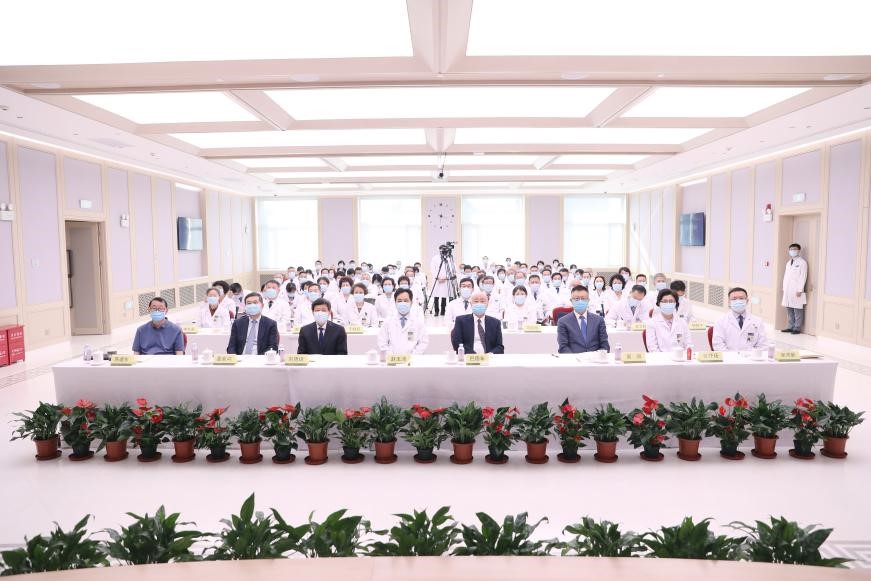On September 16, 2022, PUMCH held the lecture on academic frontiers, the first of its series of academic activities to celebrate the 101st anniversary of the hospital. The lecture aims at providing the boost needed to propel the hospital onto a track of more vigorous development in the next 100 years ahead. The lecture brought together six strategically important scientists, who delivered riveting presentations and had animated exchanges on such themes as life science, medical technology innovation, pathogenesis, organ transplantation and pharmacology. The lecture was co-chaired by academician Zhao Yupei, who is the Honorary President of PUMCH, PUMCH President Zhang Shuyang, and PUMCH Vice President Wu Peixin.
In the opening ceremony, President Zhang Shuyang pointed out that on the new journey, PUMCH must actively serve and integrate itself into the national strategy and focus on the frontier of medical science and technology and the clinical needs of major diseases Tapping its building and development as a national medical center, PUMCH would speed up its efforts to seek wider opening, stronger systems, more innovative mechanisms and enhanced capabilities in a bid to pursue its high-quality development, firmly taking up the important responsibility of promoting the medical development in China.
, Mr. Ba Denian, academician of the Chinese Academy of Engineering, said in his speech that he is very proud to be part of PUMCH, which is reputed as the top medical institution in China, and that he has the fondest memories of his time working in PUMCH. With its spirit that has been kept alive generation after generation, unique educational philosophy, and vibrant creativity, PUMCH has become a well-established cradle of elite medical talents. Academician Ba Denian expressed the hope that PUMCH would, under the strong leadership of the Party, continue to play a pioneering role and contribute to the Healthy China initiative and the health and prosperity of the Chinese people.
Academician Zhou Qi, Vice President of Chinese Academy of Sciences, shared his insights on multiple emerging areas featuring accelerated technological changes worldwide, such as big data, biotechnology, cognitive neuroscience and artificial intelligence, cellular therapies, gene editing and regenerative medicine, as well as the outstanding achievements of China concerning stem cell therapy for Parkinson’s disease and COVID-19.
Academician Zhan Qimin, Boya Chair Professor of Peking University, pointed out that there are both opportunities and challenges for the development of health in China and that clinical research should adhere to the innovation-driven development strategy. He also demonstrated the bright prospects of innovative technologies such as life omics, stem cells and regenerative medicine, innovative drugs, vaccines and antibodies, personalized treatment and biological therapy, modern medical devices, and big data and intelligent medicine.
Academician Liu Depei, Director of State Key Laboratory of Medical Molecular Biology, taking complex diseases such as cardiovascular and cerebrovascular diseases and malignant tumors as examples, introduced the application of several cutting-edge technologies such as gene sequencing, microbiomics and immunomics in the study of pathogenesis, illustrating that complex diseases are jointly influenced by genetic and environmental factors. His presentation is a case in point of the innovative thinking mindset of great scientists.
Academician Dong Jiahong, President of Beijing Tsinghua Changgung Hospital affiliated to Tsinghua University, succinctly explained the past, present and future of organ transplantation; using as examples his hospital’s explorations in transplantations of important organs such as the liver, kidney, lung, small intestine and pancreas, he presented the various transplantation teams and their outstanding achievements, and demonstrated that organ transplantation in China is among the best worldwide.
Academician Jiang Jiandong, President of the Institute of Pharmaceutical Sciences, the Chinese Academy of Medical Sciences, presented the clinical trials of using Azvudine, a drug for treating AIDS, to prevent and treat COVID-19 and of using chlorogenic acid as a cancer cell differentiation inducer to treat glioma, and the biological basis of “repurposing” the old drug of berberine. He also expounded on the trend of future R&D on major diseases revolving around treating both the symptoms and the root cause as well as around targeted therapy.
Vice President Wu Peixin said that science and technology innovation is the indispensable driving force for PUMCH in the next 100 years ahead. Thanks to the series of academic activities to celebrate the 101st anniversary of PUMCH, all PUMCHers will gain a deeper understanding of new trends in life science, accelerate their pace towards new interdisciplinary fields, adapt themselves to new paradigms of scientific research and pay more attention to new clinical needs. On the journey of building PUMCH into a National Medical Center, all PUMCHers will all contribute their share to the high-quality development of the hospital.

Main forum of the Lecture on Academic Frontiers
Written by: The Publicity Department and the General Office
Picture courtesy: Sun Liang
Translator: Liu Haiyan
Editor: Wang Yao
